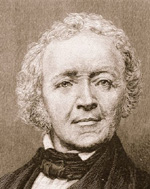Leopold von Ranke
The Unity of Truth
Here is the end of Ranke's Forward (Vorrede) to his History of Germany in the Reformation. This extract continues past the quotation already given as an aphorism, to the end of the document. It gives a slightly more consecutive sense of the man than does the shorter aphorism, and it concludes with a statement of his confidence that Truth (behind which term, Ranke, a pious Lutheran, certainly saw some form of God) was everywhere in history. We may read his words in a more objective sense, a sense for which Ranke's own work has prepared us, as affirming that the past does exist, and that all correct descriptions of it tend to converge.
Ich sehe die Zeit kommen, wo wir die neuere Geschichte nicht mehr auf die Berichte, selbst nicht der gleichzeitigen Historiker, ausser insoweit ihnen eine originale Kenntnis beiwohnte, geschweige denn auf die weiter abgeleiteten Bearbeitungen zu gründen haben, sondern aus den Relationen der Augenzeugen und den echtesten, unmittelbarsten Urkunden aufbauen werden. Für die hier behandelte Epoche ist diese Aussicht schon nicht mehr fern. Mir selbst kam noch eine Anzahl Aktenstücke zugute, die ich bei einem früheren Unternahmen in den Archiven zu Wien, Venedig, Rom und besonders Florenz gefunden. Hätte ich das Detail weiter vermehren wollen, so hätte ich fürchten müssen, es nicht mehr übersehen oder auch in der Länge der Zeit die Einheit des Gedankens nicht festhalten zu können, der sich mir aus den bisherigen Studien erhoben hatte.
Und so schritt ich mutig an die Ausarbeitung dieses Werkes, überzeugt, dass, wenn man nur mit ernstem und warheitsbeflissenern Sinne in den echten Denkmalen einigermassen umfassende Forschungen angestellt hat, spätere Entdeckungen zwar wohl das einszelne näher bestimmen werden, aber die Grundwahrnehmungen doch zuletzt bestätigen müssen. Denn die Warheit kann nur eine sein.
I see the time coming when we will base modern history no longer on secondhand reports, or even on contemporary historians, save where they had direct knowledge, and still less on works yet more distant from the period; but rather on eyewitness accounts, and on the most genuine, the most immediate, sources. For the epoch treated in the following work, that prospect is no very distant one. I myself have made use of a number of records which I found while in pursuit of another subject, in the archives of Vienna, Venice, Rome, and especially Florence. Had I gone into further detail, I should have run the risk of losing sight of the subject as a whole, or, given the necessary lapse of time, the risk of breaking the unity of conception which had arisen before my mind in the course of my researches.
And thus I proceeded boldly to the completion of my work, being convinced that when an investigator has made researches of some extent in authentic records, with an earnest spirit and a genuine desire for truth, though future discoveries may indeed determine certain details more precisely, they can only strengthen his fundamental conception. For Truth can be but One.
22 March 2004 / Contact The Project / Exit to History Page
